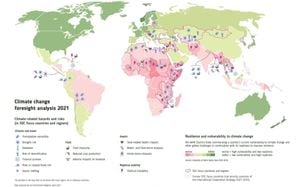A Tunisian court has handed down lengthy prison sentences to several prominent politicians, former officials, and journalists, intensifying fears of political repression under President Kais Saied. The most notable among those sentenced is Rached Ghannouchi, the veteran head of the Islamist-leaning Ennahda party, who received a staggering 22-year term. Meanwhile, former Prime Minister Hichem Mechichi was sentenced to 35 years, marking significant legal repercussions for high-ranking political figures and stirring widespread criticism.
According to defense lawyers, these sentences come amid broader accusations of repression aimed at silencing dissent against Saied's administration, with critics asserting these actions represent not just legal decisions but calculated political moves. Ghannouchi, aged 83, has been imprisoned since 2023, earlier receiving two sentences totaling five years for separate cases, whilst Mechichi has been living abroad since 2021, shortly after Saied dismissed him and dissolved the elected parliament, which many viewed as a coup.
Lawyer Mokthar Jmai, representing some of the accused, described the court’s rulings as "unjust and political" and claimed they are aimed at eliminating political opponents. He confirmed plans to file appeals against the sentences. The Ennahda party characterized the trial as a blatant violation of judicial independence and part of a wider assault on rights and freedoms within Tunisia.
Overall, 41 individuals faced charges related to conspiring against the state, with significant sentences also imposed on journalists. Notably, journalist Chahrazad Akacha, who fled abroad, received a 27-year sentence, signaling the extended reach of these punitive measures. Another journalist, Chadha Haj Mbarak, was sentenced to five years and is currently incarcerated. Her brother, Bassam Haj Mbarak, spoke out against the harshness of the sentence, declaring, "My sister is innocent, and this sentence is harsh for a journalist who was just doing her job." This sentiment echoes many others who feel the current political climate is intolerant of media freedom.
The court also imposed sentences of 15 years each on former intelligence director Lazhar Longo and former interior ministry spokesman Mohamed Ali Aroui. Critics argue these convictions reflect broader efforts to systematically undermine opposition, with many political party leaders now languishing behind bars on what they assert are fabricated charges. These developments have rekindled fears of authoritarianism reminiscent of Tunisia’s pre-revolution era.
Saied's government is accused by many opposition leaders and civil society actors of dismantling the democratic framework established after the 2011 revolution, which led to the ousting of long-ruling autocrat Zine El-Abidine Ben Ali. The president, for his part, has vehemently denied allegations of orchestrated coups, asserting his actions were necessary to rescue Tunisia from chaos and mismanagement. He has labeled his critics as criminals, traitors, and terrorists, issuing stern warnings to judges considering the release of political prisoners.
This series of convictions has drawn international attention and concern, with human rights observers noting the troubling pattern of suppression. The move has raised alarms over the future of free expression and political pluralism within Tunisia, as many wonder whether democratic progress made over the past decade is slipping away under increasing authoritarian control.
With tensions mounting, the developments have left many Tunisians reeling, contemplating the consequences of losing fundamental rights and freedoms. The ramifications of these sentences extend beyond those directly involved, as they tap deep-seated fears of political persecution among citizens and raise questions about the rule of law and justice within the nation.
Upcoming appeals are expected to shed more light on the political motivations behind these sweeping sentences as Saied’s administration navigates mounting pressure both domestically and internationally. How these cases evolve could set significant precedents for the future of political dissent, journalism, and judicial independence within Tunisia.



